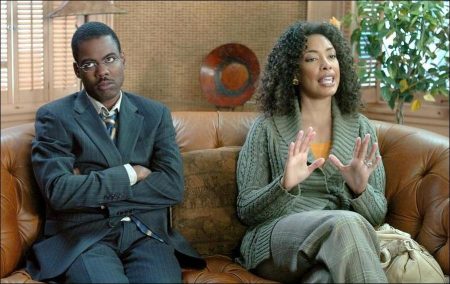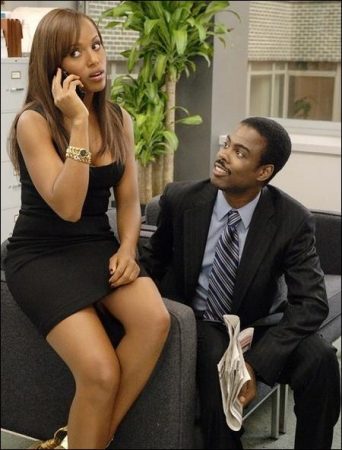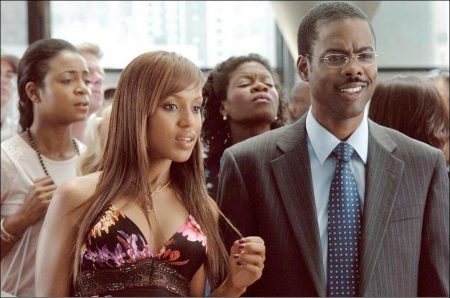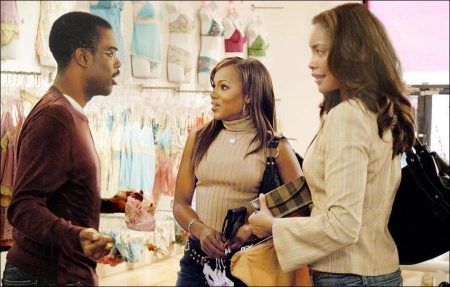Tagline: In marriage, no one can hear you scream.
I Think I Love My Wife. Brenda wears comfortable, cotton panties; Nikki wears sheer, lacy thongs. Richard Cooper is in the middle, with a good job in Manhattan, a house in the suburbs, and two cute children with Brenda, his intelligent, good-looking wife who’s a teacher. But there’s no sex in this seven-year marriage, so Richard’s bored. Into the mix walks Nikki, a sexy, sassy, single friend he’s not seen in years. Nikki has problems and finds a reason to stop at his office every day. He tries to help, they have some fun, and he doesn’t mention Nikki to Brenda. His work and reputation suffer. Is he about to scratch the seven year itch? What choices does Richard have?
“I Think I Love My Wife,” written, directed by and starring Chris Rock, is a sophisticated comedy about marriage and the lure of a new love. Nikki (Kerry Washington) is the exciting free spirit who makes Richard’s (Chris Rock) daydreams come true while Richard’s wife Brenda (Gina Torres) is so preoccupied with her own career and raising their two children that she has little time for her husband.
I Think I Love My Wife is a 2007 romantic comedy film starring Chris Rock and Kerry Washington. Rock co-wrote the film with Louis C.K. and also directed and produced it. It is a remake of the 1972 French film, Chloe in the Afternoon, by Éric Rohmer. Chris Rock stars as Richard Cooper, a happily married man faced with a mind-boggling predicament; Gina Torres (“Alias,” “The Shield”) is Brenda, his wife of seven years who’s not about to let go of the man she loves; and Kerry Washington (Ray, The Last King of Scotland) is Nikki, the bold bombshell with the power to blow Richard’s formerly routine life right out of the water.
A French Classic Re-Envisioned
Comedian (not to mention family man) Chris Rock has long been fascinated by the angst surrounding the hot-button topics of marriage, fidelity and the battle of the sexes – and has made it prime territory for his unique brand of comedy. So when he recently encountered a film considered a true classic on the subject of married life’s frustrations and temptations — Eric Rohmer’s internationally acclaimed Chloe in the Afternoon – he was struck with a typically irreverent thought: why not transform this serious French story of human foibles and moral dilemmas into a far edgier American comedy?
“I like to find things that aren’t that funny and then make them funny,” comments Rock. A witty, elegant but very, very French character study, Chloe in the Afternoon presented the story of a happily married Parisian man who loved to daydream about other women but never even entertained the idea of actually being unfaithful, until his old acquaintance Chloe dropped by his office and began to seduce him. Part of a series by New Wave cinema pioneer Rohmer entitled “Six Moral Tales,” the film probed the fuzzy lines between fantasy and infidelity and between real commitment and the hunger for instant excitement.
Rock thought it would be interesting to do the same, but in his own inimitable and fearless way. Thus was born I Think I Love My Wife. For Rock, the film was a chance not only to tell the humor-filled truth about the pitfalls and pratfalls of married life but also an opportunity to shine a little ray of hope on the state of modern matrimony. “Marriage can be a beautiful, beautiful thing,” Rock muses.
Of course, he knew that many would laugh at the very idea of comedian Chris Rock taking on French auteur Eric Rohmer, or at least see it as a major risk. “Everybody was ‘are you nuts?’” Rock recalls. “But I said, ‘I can do this.’”
To bring a fresh, contemporary and decidedly comedic perspective to Rohmer’s tale, Rock turned to his frequent collaborator and fellow comedian Louis C.K., who, like Rock, is married with children – and has a lot to say about the potential disasters that can come with that status. Louis C.K.’s own comical take on marriage recently came to the fore in his decidedly frank, controversial HBO sitcom about a working-class couple, “Lucky Louie.”
“I sent Louis the Erich Rohmer movie, and he loved it,” remembers Rock. In fact, C.K. not only loved the movie but saw in it the potential for him and Rock to really go to town with a subject close to both their savagely funny minds. “This was a great story for us because I think Chris and I both share a certain realism about marriage. We know that it’s a mixture of hope and despair, a constant fluctuation between the two,” C.K. observes.
He continues: “It’s a subject that’s very universal and timeless. To me, I Think I Love My Wife isn’t really about infidelity – it’s about testing one’s ability to stay with one of the toughest things in the world, which is marriage with kids. I think married people can look at this material and find a safe place to acknowledge the miseries of marriage and parenthood — but laugh at it at the same time.”
In fact, both Rock and C.K. note that there haven’t been very many comedies geared to the current generation that tackle the touchier, more trouble-prone side of marriage. And yet, it is very much on people’s minds, especially as more and more young people become parents. “I think guys are starting to take a really long look at who they are as married men and as fathers,” says Louis C.K. “So the idea of Chris being in a movie like this was really compelling. The character of Richard thinks he’s kind of got life figured out, but then this woman shows up and says ‘maybe you’re sort of dying early without realizing it. Maybe you’re not really living your life.’ It’s every married man’s biggest nightmare.”
He adds: “People will always wonder not only whether the grass might be greener on the other side, but also, if maybe there’s some candy there, too! It’s human nature to be fascinated with whatever you don’t have. But I also think in any long-term relationship between husband and wife, people fall in and out of love several times – and that’s what Richard and Brenda are going through in the film.”
Rock and C.K. faced a unique challenge in adapting Chloe in the Afternoon, which was rife with a 1970s European sensibility and lengthy voice-over discourses. Although they retained the original film’s basic structure – a successful businessman with a wonderful wife and family meets an old friend who offers a nearly irresistible temptation – the dialogue and situations began to bear the unmistakable marks of Rock’s raucous stand-up comedy candor. Certain scenes, including one in which two married couples meet for dinner and the wives are friends while the husbands are not, are derived directly from some of Rock’s best-loved routines.
By the time the screenplay was finished, the forthright, fast-paced tone of the piece had become quite stylistically different from Rohmer’s existential musings. The story was not only infused with a lot of Rock’s humor, but also the bracingly fearless honesty that has set Rock apart among his peers. “When I do stand-up, I talk about things that make people a little uncomfortable, and the laughs a lot of the time are the release of the tension that’s in the room,” Rock explains. “Hopefully that’s what happens in this film.”
Although it hadn’t been his intention at the outset, Rock eventually reached the realization that the film would become his sophomore directorial effort. “This is kind of an intimate project where I felt I would really need to share a point of view with the director,” says Rock. “Working with a stranger on this was just not appealing to me.”
While Rock took on the multi-faceted roles of director, producer, co-writer and star, Lisa Stewart – whose credits include co-producing Cameron Crowe’s award-winning rock memoir Almost Famous – came on board to produce along with Rock.
Stewart couldn’t resist the idea of Chris Rock directing a film about the trials and tribulations of modern marriage. “I think Chris brings a really unique and funny perspective to a great, relevant subject,” she says. “It’s also not your typical Chris Rock comedy, which makes it even more interesting. You might expect this from Woody Allen or any number of people, but not from Chris Rock. This is really adult, sophisticated comedy he’s venturing into.”
The film’s ultimate avoidance of the usual Hollywood romantic fairy tale particularly appealed to Stewart. “I think it’s a very honest portrait of a marriage, and it’s that same honesty which makes Chris’s comedy so unique,” Stewart comments. “He doesn’t shy away from the warts.”
A long-time fan of Rock’s work, Stewart thinks his evolution as a comic has brought him to the new place he explores in I Think I Love My Wife. “We’ve all watched Chris go from being this fearless teenage comedian in the clubs to a married man in the suburbs,” she says. “Now, he has to deal with the issues of being a husband and a father that everyone has to deal with, and this is a lot of fun to watch.”
Husband, Wife and Breath-Taking Temptation
At the heart of I Think I Love My Wife’s humor and human observation is the character of Richard Cooper, a well-heeled investment banker who appears on the surface to have absolutely everything of which a man could dream. He lives with his lovely schoolteacher wife, Brenda, and their two young children in the suburbs of New York City and commutes everyday to his job as the sole black executive at the prestigious investment firm of Pupkin & Langford.
But Richard has one hazardous weakness: a wandering eye. No matter how much he loves his wife, he can’t help but see ridiculously gorgeous women everywhere he goes — on the train commuting to work, on the streets walking to work, at work, on his way home from work, everywhere. He just can’t seem to escape them, or the reminder they carry that a certain part of his life is over for good.
There was never any doubt for Chris Rock, who knew this character inside and out, that he would play Richard. For Rock, the character’s mix of family devotion and over-active fantasy was perfect for his kind of comedic portrait. Producer Lisa Stewart notes that Rock kept adding layers and lines to the character even as the film was in progress. “He’s still Chris Rock so there were all kinds of ad-libs,” she explains. “We’d be doing a scene that was already beautifully written but then he’d just go off on a tear – and everybody had to try to keep up!”
Says Rock of the character: “I always say that there are two types of guys who think about cheating. There are those who just hate the opposite sex, and it’s just a way of letting out their frustration. But then you’ve got guys who simply love women. They’re just always a sucker for a damsel in distress. And to me, that’s Richard Cooper.”
Despite his mischievous imagination, Richard never even considers cheating on his wife until one particular damsel provides a terribly tempting opportunity. This is the stunning Nikki Tru, the girlfriend of a friend of Richard’s from his long-past clubbing days, who appears at Richard’s office door one day looking for help finding a job, and looking very fine indeed. As Nikki and Richard start spending innocent afternoons together during Richard’s late lunches, their relationship gets more and more complicated by mutual attraction.
Yet even as Richard begins to falter at keeping Nikki at bay, he becomes more and more keenly aware of what’s at stake – the entire life he has created. “Richard definitely goes from being very selfish to figuring out what he wants in life and also seeing how his actions affect a lot of people,” explains Rock.
For Rock, Richard’s ultimate need to make a choice is what makes his predicament not only filled with hilarious circumstances but very real. “There’s no black or white in this situation,” he comments. “Hopefully when people walk out of the theater, there’s a debate that will continue over who he should be with.”
Key to creating Richard’s crisis of temptation would also be casting the character of Nikki Tru. Rock knew he needed an actress who could make Nikki absolutely, unavoidably alluring, but without being the clear-cut villain. Even while he and Louis C.K. were writing the screenplay, Rock had asked Kerry Washington to take the role of Richard’s wife during an informal reading. The two had worked together years ago on the comedy Bad Company and Rock had watched with pleasure as Washington ascended to critical acclaim with diverse performances in such films as the Oscar-winning Ray and the recent Last King of Scotland. Now, he saw her in a whole new light.
“Kerry was like that kid in the neighborhood you still think is a kid and then you come home and – she’s sexy! ‘You think – hey, what happened to you?’” Rock explains. ”I saw her on the cover of some magazine, and I was like, who the f— is this? She was so hot, and I was like, ‘Kerry Washington? Wow! We gotta get her for Nikki!’ She’s one of the most beautiful women out. I think we got lucky.”
Lisa Stewart was equally excited by the idea. “”Kerry’s got a really interesting body of dramatic work,” says Stewart. “Chris saw a chance to showcase her talent in a more comedic light.”
Washington loved the frankness of the screenplay and was drawn to the chance to explore something not often explored on screen – what might cause a single woman to make advances towards a married man. “I know women who have gone through this kind of experience,” she says. “I think it really comes from a place of needing to be loved, of needing to have attention. I think it’s very complicated and very human.”
Nikki, Washington notes, is the kind of woman who has always relied on the obvious impact she has on men to help her along in life. And yet, Washington thinks her sexual is partly a cover. “She acts braver than a lot of woman, but she’s also more scared than a lot of are,” Washington explains. “Ironically, it’s Nikki’s vulnerability and her need and her that helps to make her so seductive.”
In playing Nikki with a vivacious realism, Washington hoped to add to the film’s noholdsbarred look at how married life can get derailed. The actress finds the topic provocative. “I really think this film is an amazing reflection of the thoughts so many people are having about relationships and about fidelity and sexuality,” she says. “It’s also interesting that this is a remake of a film that was made thirty years ago, yet all the issues remain the same.”
As the story of I Think I Love My Wife unfolds, Nikki’s seductive powers don’t only turn Richard Cooper’s life upside down. They also begin to shake up Richard’s wife, Brenda, as all three begin to carve out a complicated triangle. To play Brenda, the filmmakers sought out an actress who would be just as strong a character as Nikki – the kind of confident, capable woman on whom it would be a very bad idea for any husband to cheat.
They found what they were looking for in Gina Torres, a rising actress who has been seen as the super-villain Anna Espinosa on television’s popular “Alias” and as Forest Whitaker’s exwife on the acclaimed “The Shield,” but remains a fresh face to film audiences. “I wanted someone who hadn’t been seen in this kind of role before so that it would help the audience really get lost in the character,” says Chris Rock. “Gina is not only an excellent actress but really funny in a straight-man kind of way.”
Kerry Washington was thrilled with the choice of her rival and nemesis. “I was excited when they brought Gina on board,” says Washington, “because I think she’s incredibly talented and perfect for the role of this terrific woman who sees her marriage in danger.”
For her part, Torres enjoyed that the role was devoid of clichés and filled with funny but realistic complications. “Chris did not just write a typical ‘wife role’ for Brenda. He wrote a very balanced part for a real woman,” she says. “That’s what attracted me to the script. Brenda’s not just a wife in name but someone who’s really in tune with and knows her man. She trusts him and believes he will come back to her, but she’s not gonna let him get away with everything, either.”
Also impressive to Torres was Chris Rock’s commitment to the material. “You could see that Chris really cares deeply about this story that he’s telling,” she says. “He wanted to make an honest movie about love and marriage and I have to applaud him for that.”
To Torres, Richard Cooper is still a good guy, even if he does fall prey to his sexual imagination. “What’s unique in this movie is that there really doesn’t seem to be anything wrong in this marriage. We’re not at each other’s throats. I’m not a harpy, he’s not a womanizer. It’s just that it’s our human nature to crave drama. I think men are conditioned to think that they’re giving up so much to settle down and sometimes they start looking for the tornado. In this case, the tornado is about five foot two, with perfect chocolate skin, the personification of single and naughty, and is what every married man thinks he’s missing out on,” Torres sums up.
With three black actors cast in the leading roles, I Think I Love My Wife definitely looks different from the original all-white, all-Gaul Chloe in the Afternoon. Yet like the comedy of Chris Rock, I Think I Love My Wife tells a story that, while never shying away from race issues, is something to which nearly everyone can relate. “What’s important to me about this movie is that it is not a different perspective,” explains Gina Torres. “We’re not saying, oh, black people do it differently. What we’re saying is, it’s universal and we all have these feelings.”
Adds Kerry Washington: “I think this film has the potential to break barriers in a way because Chris is so loved across the board and he’s really committed to making a film that, even though it’s primarily an African American cast, really crosses color lines. I think he has the potential to, in some ways, combine the best of Spike with the best of Woody.”
I Think I Love My Wife (2007)
Directed by: Chris Rock
Starring: Chris Rock, Kerry Washington, Gina Torres, Steve Buscemi, Samantha Ivers, Cassandra Freeman, Eliza Coupe, Christina Vidal, Edward Herrmann, Welker White, Wendell Pierce
Screenplay by: Louis C.K., Chris Rock
Production Design by: Sharon Lomofsky
Cinematography by: William Rexer
Film Editing by: Wendy Greene Bricmont
Costume Design by: Suzanne McCabe
Set Decoration by: Chryss Hionis
Art Direction by: Toni Barton, Alicia Maccarone Adam Scher
Music by: Marcus Miller
MPAA Rating: R for pervasive language and some sexual content.
Distributed by: Fox Searchlight Pictures
Release Date: March 16, 2007
Views: 85







